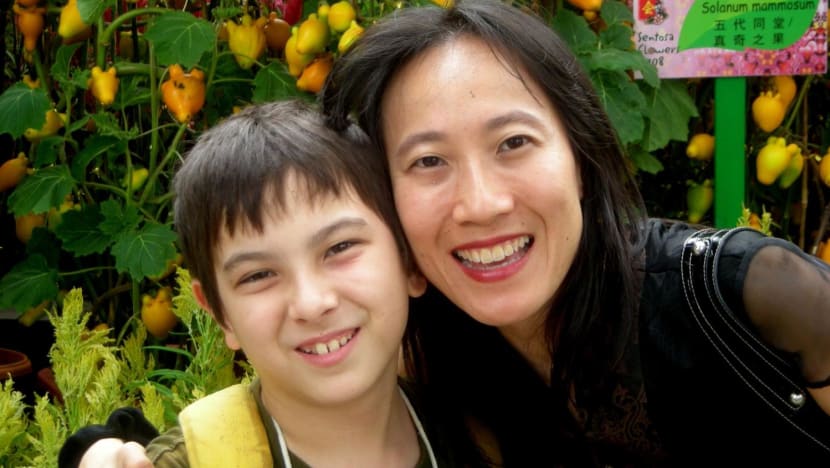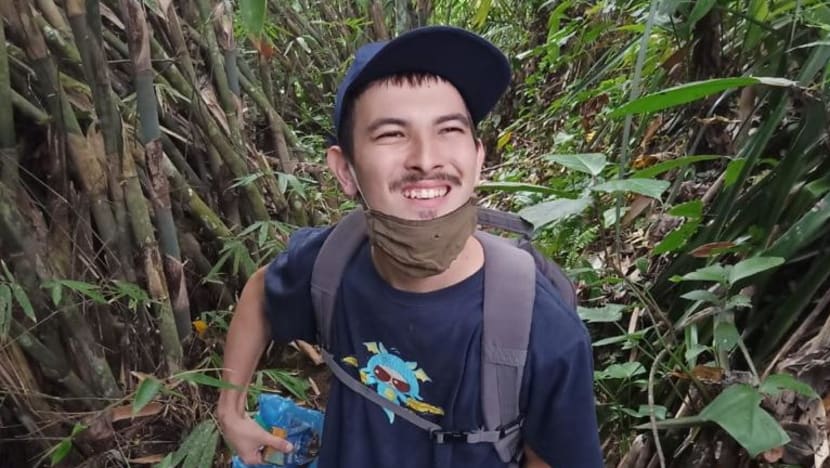Why a mother decided to let her non-verbal autistic son live independently in Bali
Sebastien, now 26, has been living in Bali for six years with carers.

Ms Choo Kah Ying with her non-verbal autistic son Sebastien. (Photo: Choo Kah Ying)
SINGAPORE: Ms Choo Kah Ying and her partner reside in Singapore, but they have chosen to let their non-verbal autistic son, now aged 26, live independently in Bali for the past six years.
It may be an unconventional decision, but she believes it is the best thing she has done for herself and her son, Sebastien.
“It was possibly the most difficult decision of my life as a mother and as a human being to move someone like my son,” she told CNA.
As a non-verbal, autistic person, he does not use language to communicate despite being able to read and write, explained Ms Choo, who has published books on her experiences.
“He is somebody who doesn't have the ability to converse, connect and relate to people the way most of us do. So that actually makes it very challenging for him, to connect with others and also to fit into the mainstream society based on our requirements,” she said.
However, discovering how nature calmed him and realising the need for him to become independent drove her decision.
“If I stayed with him, every time things went wrong, he would always come running towards me, but with the carers (in Bali) … he got to be this young man,” she said.
At the time, he could already independently cook, fold clothes and take care of himself.
THE TEEN YEARS
Ms Choo’s decision to put distance between her and her only son came from love, desperation and fear.
Ms Choo homeschooled Sebastien after the family moved from the United States to Singapore when he was 10 years old.

She had set rules to try and get him to regulate his behaviour, so he would fit into mainstream society. This included getting him to stop flapping his hands, making certain noises and covering his ears in public.
If he did not comply, the consequences included withdrawing things he liked. It seemed logical to her at the time, said Ms Choo, who even advocated the system to other parents of autistic children.
But things started going downhill after he turned 15. She started being on the receiving end of his attacks.
“I essentially thought I was going to die by the time he was hitting 20,” she added.
“He started being very angry. He would shout my rules at me, the consequences, and that he didn't care. He would scream like an animal and he would hit me,” she said.
She also would never know what would trigger him, said Ms Choo. She recounted, for instance, how he would hit her if she told him his shorts were too small, when he was going through a growth spurt.
“The attacks kept happening and I was being pushed to the ground and my head against the wall,” she said.
THE DIFFICULTIES OF DAILY LIFE
She would threaten to call the police and keep him inside the house, but things only got worse.
Daily life got hard because anything that went wrong, like when a light bulb or speaker did not work, became a crisis.
“He would demand for them to be fixed immediately,” she said, adding that he would hurt himself if the demand was not met. “And I began just really being very terrified.”
Ms Choo had to stop taking public transport because he would insist on sitting in the last row, in the middle seat that came with a seatbelt.
If somebody sat there, he would make the person move by staring at him, she recalled, noting that even a faulty seatbelt would make him angry.
“He would start banging his head on the bus, and then start attacking me to get me to try to fix the situation,” she said.
He would bang his head with his fist so hard that it would sound like a basketball bouncing on the ground, said Ms Choo.
“Every day, (I) was just walking on eggshells. It was extremely stressful. And nobody knew what to do.”
She felt that Singapore was not the right place for him because of her presence.
“The relationship between the primary caregiver and an autistic person is very enmeshed. Actually, by the time they get older, like hitting adult age and if they're still feeling very angry, they often turn to the primary caregiver to be the one who makes them feel better, “ she said.
“The hitting and everything is not trying to hurt you, but them just letting up frustration on you, knowing that you will still love them.”
She was also afraid that Sebastien would get so angry that he would kill her.
“It's not that I would die. It's not a big deal for me. But then because if he had killed me, he might be in trouble and that would ruin his life. And I didn't want that to happen,” she said.
THE DAY THE SEED WAS PLANTED
It was during a family holiday on a quiet Indonesian island in 2012 that Ms Choo discovered something new about Sebastien. He was calmer when surrounded by nature.

One of the nights during the holiday, Ms Choo asked her son to join her on a walk along the seaside, near her villa. And she saw him become very quiet and still, nothing like how he used to be in Singapore.
"He was just immersed completely in the environment until he was as quiet as water, as quiet as the sky," she told CNA.
It was the most peaceful, the most still she had seen her son Sebastien, then 16 years old.
"In Singapore, he moves and fidgets so much that if you fix your eyes on him, you will get motion sickness," she said, adding that it was a result of him tracking everything in an overwhelming environment.
The experience left Ms Choo imagining Sebastien living in a village independently.
“I fantasised that he’ll be learning how to fix fishing nets (or) go fishing on boats with the others (in the village) because he's such a nature boy,” she said.
“But at that point, it's like such a fantasy. I had no idea how that was going to happen.”
When she told her loved ones, they thought she was crazy, Ms Choo recalled.
Yet she forged ahead, trying to arrange affordable housing and looking for potential carers.
MAKING THE FANTASY A REALITY
Ms Choo eventually made it happen when he was 20 years old. She sent him to live in a village in Bali, having first travelled there to recce in July 2016.
The journey, however, has not been without challenges.
Initially, she shuttled between Singapore and Bali every two weeks.

“I didn't have enough trust, but I had to try,” she said, adding that the first villa she rented for Sebastien was fitted with surveillance cameras.
“The problem also was that we couldn't find good carers … And that was a huge issue,” she added.
The first couple of years were really hard, she noted.
One carer has been with her son throughout the six years, while the others have come and gone and not necessarily treated him well.
Despite some trying times, Sebastien has healed and grown, Ms Choo said.
THE BALI EFFECT
The changes in her son may, however, not be what society expects, she said.
People may ask if he talks more and has got rid of erratic behaviours such as banging his head, she said.
“The biggest change in some way is about us, looking at him in a very different light. One of the big things is we've suspended our expectations of him behaving like a typical person in terms of relating,” said Ms Choo, who now works on educating others on autism.
“We don't expect him to speak in sentences. We (don’t) expect him to always greet us or say something.”
She now knows how to interact with him and understand where he is coming from, she added.
"He's not trying to hurt me because he's an aggressive, violent and horrible person who I used to think he was. Rather, before, I mistakenly did not realise that he was seeking my help," she said.
However, she still gets hit sometimes.
"It can be a bit painful, but a lot less painful these days. He's trying to control himself. So, we started to see that he is doing his best," she said.
Ms Choo said he bangs his head lightly even when he does.
Sebastien, a talented artist whose works are sold on Ms Choo’s website, has tasted, and learnt to cook a wider variety of food, Ms Choo added. He has also picked up carpentry from the villagers, she added.
Ms Choo said the concept that parents should look after their special needs children all the way through adulthood until they cannot take it anymore is “incorrect”, she said.
“It actually is not allowing our kids to grow up. Let go of them.”



















